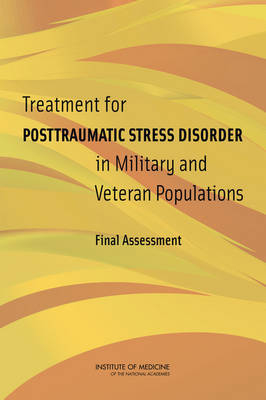
Treatment for Posttraumatic Stress Disorder in Military and Veteran Populations
Final Assessment
Seiten
2014
National Academies Press (Verlag)
978-0-309-30173-2 (ISBN)
National Academies Press (Verlag)
978-0-309-30173-2 (ISBN)
Posttraumatic stress disorder (PTSD) is one of the signature injuries of the U.S. conflicts in Afghanistan and Iraq, but it affects veterans of all eras. It is estimated that 7-20% of service members and veterans who served in Operation Enduring Freedom and Operation Iraqi Freedom may have the disorder. PTSD is characterized by a combination of mental health symptoms - re-experiencing of a traumatic event, avoidance of trauma-associated stimuli, adverse alterations in thoughts and mood, and hyperarousal - that last at least 1 month and impair functioning. PTSD can be lifelong and pervade all aspects of a service member's or veteran's life, including mental and physical health, family and social relationships, and employment. It is often concurrent with other health problems, such as depression, traumatic brain injury, chronic pain, substance abuse disorder, and intimate partner violence. The Department of Defense (DoD) and the Department of Veterans Affairs (VA) provide a spectrum of programs and services to screen for, diagnose, treat for, and rehabilitate service members and veterans who have or are at risk for PTSD.
The 2010 National Defense Authorization Act asked the Institute of Medicine to assess those PTSD programs and services in two phases. The Phase 1 study, Treatment for Posttraumatic Stress Disorder in Military and Veteran Populations: Initial Assessment, focused on data gathering. Treatment for Posttraumatic Stress Disorder in Military and Veteran Populations Final Assessment is the report of the second phase of the study. This report analyzes the data received in Phase 1 specifically to determine the rates of success for each program or method. Treatment for Posttraumatic Stress Disorder in Military and Veteran Populations Final Assessment considers what a successful PTSD management system is and whether and how such a system is being implemented by DoD and VA. This includes an assessment of what care is given and to whom, how effectiveness is measured, what types of mental health care providers are available, what influences whether a service member or veteran seeks care, and what are the costs associated with that care.
This report focuses on the opportunities and challenges that DoD and VA face in developing, implementing, and evaluating services and programs in the context of achieving a high-performing system to care for service members and veterans who have PTSD. The report also identifies where gaps or new emphases might be addressed to improve prevention of, screening for, diagnosis of, and treatment and rehabilitation for the disorder. The findings and recommendations of Treatment for Posttraumatic Stress Disorder in Military and Veteran Populations: Final Assessment will encourage DoD and VA to increase their efforts in moving toward a high-performing, comprehensive, integrated PTSD management strategy that addresses the needs of current and future service members, veterans, and their families.
The 2010 National Defense Authorization Act asked the Institute of Medicine to assess those PTSD programs and services in two phases. The Phase 1 study, Treatment for Posttraumatic Stress Disorder in Military and Veteran Populations: Initial Assessment, focused on data gathering. Treatment for Posttraumatic Stress Disorder in Military and Veteran Populations Final Assessment is the report of the second phase of the study. This report analyzes the data received in Phase 1 specifically to determine the rates of success for each program or method. Treatment for Posttraumatic Stress Disorder in Military and Veteran Populations Final Assessment considers what a successful PTSD management system is and whether and how such a system is being implemented by DoD and VA. This includes an assessment of what care is given and to whom, how effectiveness is measured, what types of mental health care providers are available, what influences whether a service member or veteran seeks care, and what are the costs associated with that care.
This report focuses on the opportunities and challenges that DoD and VA face in developing, implementing, and evaluating services and programs in the context of achieving a high-performing system to care for service members and veterans who have PTSD. The report also identifies where gaps or new emphases might be addressed to improve prevention of, screening for, diagnosis of, and treatment and rehabilitation for the disorder. The findings and recommendations of Treatment for Posttraumatic Stress Disorder in Military and Veteran Populations: Final Assessment will encourage DoD and VA to increase their efforts in moving toward a high-performing, comprehensive, integrated PTSD management strategy that addresses the needs of current and future service members, veterans, and their families.
1 Front Matter; 2 Summary; 3 1 Introduction; 4 2 Diagnosis, Course, and Prevalence of PTSD; 5 3 PTSD Programs and Services in the Department of Defense and the Department of Veterans Affairs; 6 4 Performance Management; 7 5 High-Value Care; 8 6 Workforce; 9 7 Effective and Safe Care; 10 8 Access to Care; 11 9 Research on PTSD; 12 10 Findings and Recommendations; 13 Appendix A: Committee Member Biographies; 14 Appendix B: Congressional Legislation; 15 Appendix C: Phase 2 Open Sessions (in order by date); 16 Appendix D: Centers, Consortiums, and Collaborations for PTSD Research; 17 Appendix E: Detailed Descriptions of PTSD Research in the Department of Defense, the Department of Veterans Affairs, and the National Institutes of Health
| Verlagsort | Washington |
|---|---|
| Sprache | englisch |
| Maße | 152 x 229 mm |
| Themenwelt | Geisteswissenschaften ► Psychologie |
| Studium ► Querschnittsbereiche ► Prävention / Gesundheitsförderung | |
| ISBN-10 | 0-309-30173-4 / 0309301734 |
| ISBN-13 | 978-0-309-30173-2 / 9780309301732 |
| Zustand | Neuware |
| Haben Sie eine Frage zum Produkt? |
Mehr entdecken
aus dem Bereich
aus dem Bereich
das Manual zur psychologischen Gesundheitsförderung
Buch | Hardcover (2023)
Springer Berlin (Verlag)
CHF 55,95
Wissenschaftlich basierte Empfehlungen, Tipps und Ernährungspläne für …
Buch (2022)
Thieme (Verlag)
CHF 69,95
Orthomolekulare Medizin in Prävention, Diagnostik und Therapie
Buch | Hardcover (2022)
Thieme (Verlag)
CHF 81,80


